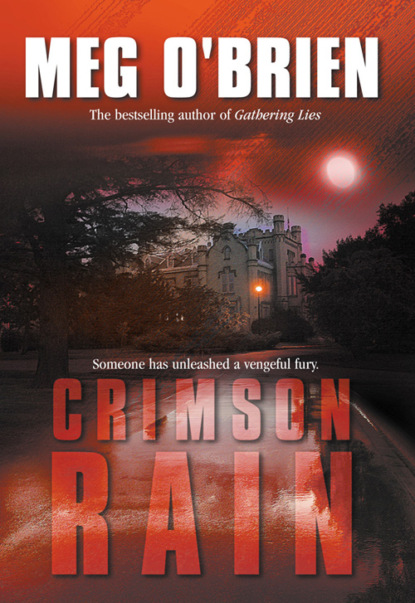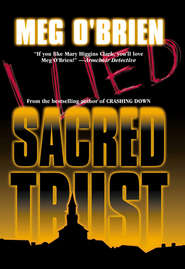По всем вопросам обращайтесь на: info@litportal.ru
(©) 2003-2025.
✖
Crimson Rain
Автор
Год написания книги
2018
Настройки чтения
Размер шрифта
Высота строк
Поля
“Cut away,” Gina replied, blowing into her hands for warmth. “And fast. Let’s get the heck out of here!”
“Darn it,” Rachel said, “I told you to wear gloves. But not to worry.” She put an arm around her mom as Paul began to saw through the trunk of the fir. “We’ll be at the tearoom soon. You can warm up there.”
The tree fell, and Rachel cried, “Attaboy, Dad! You’d put Paul Bunyan to shame!”
Paul grunted. Looking at Gina and his daughter, at the smiles on their faces and the way they both rose to the occasion when good spirits were called for, he could only think: I wish I were a Paul Bunyan, a giant possessed of superhuman powers. Maybe then I could figure out a way to fix this moment in time forever.
After dragging the tree into the house and changing clothes, they drove down the hill to the tearoom. In an old Victorian house with several differently decorated rooms, it was warm and toasty from a huge fireplace in the large front room. Taped chamber music was soft and soothing, and the scents of cinnamon, apples and other holiday treats stimulated the appetite and brought back memories of traditional Christmases Paul had enjoyed as a child.
This, too, was a tradition that Paul, Gina and Rachel had followed. First the cutting of the tree—from a lot where trees were specifically grown for Christmas, to ease Rachel’s concern over the destruction of the forests—and then tea, to warm themselves up.
Over the subdued murmur of voices and the gentle clinking of bone china cups against saucers, Paul looked at his wife and daughter. Rachel’s cheeks were still pink from the cold, and the bright pink scarf she wore mirrored them. Her eyes shone in the candlelight. Without warning, a memory rushed in: Angela, and the way her eyes had been so like Rachel’s in color, that clear, lovely hazel, yet always with a flicker of mischief in them.
Rachel was wrong in thinking he’d had some sort of contact with Angela. Yet her instincts were right. Everything about this season combined to form a gunnysack of immense proportions that he seemed destined, always, to carry on his back. He knew that if he opened that sack, more bad memories than he’d ever be able to live with would spill out.
It was one of the reasons, he admitted to himself, that he’d become involved with Lacey. In September, the stores had already been bringing out the Christmas toys and decorations. They were everywhere, and Paul had begun to dread the coming holiday even more than usual this year. There were times when he felt certain his life was over, and other times when he wished it were.
This past summer, he and Gina had barely seen each other for weeks on end. She was working on a house up on Camano Island, more than an hour away, and she often came home late. Finally he had stopped going home after work, and had begun to have dinner in the city. His favorite place was the Gordon Biersch Brewery Restaurant, because there were always plenty of people there—young people, active and happy, or at least seemingly happy as they laughed and drank together after their day’s work. Sitting in a bar drinking wasn’t Paul’s idea of a rousing good time, but having dinner at the bar and watching everyone around him enjoy themselves made him feel less lonely.
He hadn’t started out with the thought that he might meet someone. At least, not consciously. He told himself he was merely passing the time. Then one night, a young blond woman at the other end of the bar began to make eye contact with him. At first, he was embarrassed. He hadn’t been with anyone but Gina since they’d met in college. On this particular night, however, Paul found himself wanting someone to talk to. That was all, he swore to himself—just talk.
So when the woman smiled at him the third or fourth time their eyes met, instead of looking quickly away as she’d done at first, Paul took that as an invitation to move to the stool beside her and join her for a drink.
It had been awkward at first. Paul found himself at a loss for words. Funny, he thought. All this time I’ve been wanting someone to talk to, and now I don’t know what to say.
But the woman made it easy for him.
“Hi, I’m Lacey,” she said softly, holding out a hand. “May I buy you a drink?”
Paul smiled and shook her hand. “I thought the man was supposed to buy the woman a drink.”
Lacey laughed and tossed her head, shaking back the lush blond hair that fell over her face on one side. Her eyes were a deep, deep green, so deep that when Paul looked into them he felt like a teenager striving for just the right poetic phrase. What he came up with was clichéd, he knew, but he honestly did feel as if he were falling into the depths of some long-forgotten, ancient sea. As for her complexion, it was creamy and flawless, except for a small half-moon scar at the corner of her right eye. She had covered it with makeup, making it less noticeable, but when she turned into the light from behind the bar, it stood out in sharp relief.
Paul was glad she had a flaw. Without it, he might have been intimidated by her beauty.
“What old-fashioned world did you come from,” Lacey teased, “thinking the man has to buy the drink?” Nodding to the bartender, she pointed a finger at his nearly empty drink glass. “Don’t tell me. You’re married, and you haven’t dated in years. And you don’t want to get involved. Well, that’s perfect, because I don’t want to, either.”
The bartender set the drink before him, and Paul relaxed. They began to talk. At ten o’clock they were still talking, and Paul, shocked at the time, said that he had to go.
“Maybe I’ll see you here again,” he said tentatively, unwilling to commit to an actual meeting, but hoping she would be here, nonetheless.
“Maybe,” she said. “I stop by after work now and then.” She touched him on the cheek with a fingernail that was bright red, like her lips. “We’ll see.”
That had been in August. Four short months ago, but he felt, now, as if he’d known her forever.
Their first conversation had carefully skirted personal information. Instead, they had talked about Microsoft, the Huskies, the Mariners, Boeing, the traffic…endless minutiae. In succeeding talks he told her about Gina and Rachel. She told him she had moved to Seattle in June and was working temp jobs. It had been difficult at first, but now she was established with one particular temp company, and in demand as an assistant to local CEOs. She living frugally, but was doing all right.
She seemed to want nothing from him but companionship, and that eased Paul’s mind about what he was doing. By the time a month had passed, however, Paul couldn’t tear himself away from the three- or four-times-a-week meetings at Gordon Biersch’s. He began to tell Gina he was working late, and she had accepted that.
But then, why wouldn’t she? he thought now as he looked across the table at his wife. He had never before given her any reason to doubt him.
And here she was, holding the family together as usual over the holiday—keeping the traditions and maintaining a brave facade for Rachel, even though she must know, as he did, that their marriage was falling apart.
Or was it a facade? Had Gina actually convinced herself there was nothing wrong? Was it possible she couldn’t see how much their relationship had deteriorated?
There were times when Paul hated himself for the betrayal of his wife, and he prayed for the strength to end it.
“Can we decorate the tree tonight?” Rachel asked from the back seat as Paul swung the Infiniti into the driveway. “That tea really hyped me up.”
Gina restrained a yawn. “Oh, I don’t know…”
“C’mon, Mom. Talk her into it, Dad.”
They had left the tree standing in a bucket of water in the front bay window of the house, facing the Sound and the city. When it was decorated and lit, it looked “awesome,” as Rachel said every year, when they drove up the hill.
“We’ve still got two more days till Christmas,” Paul said, wanting only to go to bed. “Can’t it wait?”
“Boy, you two are party poopers this year.” Rachel pouted. She slid from the car and ran up the front steps. “Last one in has to untangle the lights!”
She slid her key into the lock and disappeared through the doorway. Lights appeared in the hallway and living room. Gina looked at Paul and shrugged. “What do you think?”
He sighed. “At least she’s smiling now. I was beginning to think—”
“I know what you mean,” Gina said. “She’s been a bear this trip.”
“Maybe we can convince her just to put on the lights tonight. You think she’d be okay with that?”
“We can give it a try,” Gina said.
Rachel’s cry from inside hit them as they came up the walk. “Mom! Dad!”
Gina and Paul ran the rest of the way, following Rachel’s voice into the living room. There they found the Christmas tree lying on its side, a pool of water surrounding it. The bucket lay empty on the hardwood floor.
Gina rushed forward, whipping off her woolen scarf and kneeling, trying to mop up the water before it did any more damage to the wood. “For God’s sake, Paul, I told you to make sure the tree was secure enough so it couldn’t fall!”
“I did,” he said, bristling at the criticism. “I’ll go get some towels.”
“Never mind. Rachel, get me that throw cover over there.”
Gina motioned to a heavy throw lying over a chair, but Rachel didn’t move. Her face was pale as she stared at the tree, her eyes dark and frightened.
“Rachel?” Gina’s tone was one of concern more than irritation, but Rachel’s head snapped up and she took a step backward.
“Don’t touch me! Get back!” Her hands rose as if to protect herself.
Gina started, and Paul stopped in his tracks to stare at his daughter.
“Rachel?” he said softly. “Rach, it’s okay.”









